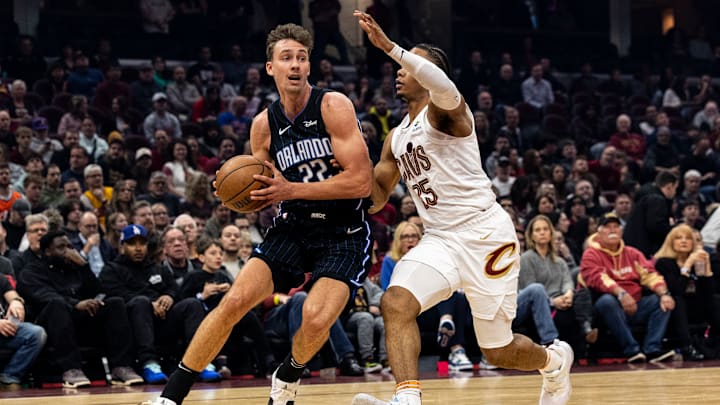Despite holding the fourth seed in the Eastern Conference and homecourt advantage in the first round, the Cleveland Cavaliers cannot afford to enter their series against the Orlando Magic expecting a free ticket to advance.
The Orlando Magic pose a serious threat to the Cavaliers, regardless of their young age and lack of starpower compared to Cleveland's Donovan Mitchell. While the Cavs are often lauded for their "Tower City" frontcourt of Evan Mobley and Jarrett Allen, the rest of the roster is relatively small compared to league standards, and especially small compared to the Magic.
Paolo Banchero, Franz Wagner and Wendell Carter, Jr. all measure to 6-foot 10-inches with Jonathan Isaac at the same height coming off the bench. Only Mobley has the size advantage against any of these four players, as Allen is just short of 6-foot 10-inches himself. Undoubtedly, the Magic will use their size to batter the Cavs in the paint nearly ever time down the floor. Orlando attempted the second-most shots within five feet of the basket this season with a healthy diet of 32.4 attempts per game.
Cleveland still must prove themselves in the post, especially in the playoffs. Last year's rebounding woes still haunt them, even if their bigs have made adjustments and learned. The Magic will test the same deficiencies the Cavs showed last season in the paint, but Orlando is far from a perfect squad.
There is a reason the Cavaliers enter the series favored to advance to the next round. The Magic are inexperienced and will likely not be able to adjust their game enough to cover for the flaws they showed over the regular season. If the Cavaliers can exploit Orlando's weaknesses, they can build an early lead and build momentum quick.
Thankfully, the Magic's worst traits play directly into Cleveland's hands. Paying attention to key attributes of their coming rivals will yield instant success for the Cavs.
How the Cleveland Cavaliers can engineer the Orlando Magic's downfall
Orlando's rough interior presence is their greatest offense tool, but it is also their worst flaw. The Cavaliers' defense is orchestrated to funnel rivals into the lane where Mobley and Allen lurk, ready to deny any rushed attempts. The Cavaliers allowed the sixth-lowest field goal percent around the basket and score the twelfth-most fast break points in the Association. Throughout Cleveland's best quarter of the season through December and January, they fourth-most points in transition.
Late-season injuries halted most of Cleveland's explosive athleticism in transition with Isaac Okoro and Donovan Mitchell, the two highest scoring players in transition, missing significant time ahead of the playoffs. With both players healthy heading into round one, the Cavs must reignite their engines and punish any missed shot by the Magic with a quick turnaround on the other end.
Fortunately for the Cavaliers, Orlando's tough-nosed defense struggled to limit fast break points, allowing the eleventh-highest number of transition buckets in the regular season. Orlando's transition defense is not a guaranteed basket every time down the lane, but Cleveland's quick execution in the open court can quickly swing things in their favor if the Magic find themselves in a cold spell. This is where the Cavaliers can really take control.
As great as Cleveland's interior defense can be, their defensive rotations on the perimeter allow more three-pointers than they should feel comfortable admitting. Teams shot 37.5 percent from deep against the Cavaliers this season, good for fourth-highest conversion rate in the NBA. While this might come back to bite the Cavs if they meet the Boston Celtics in the conference semifinals, daring the Magic to shoot from three will play into Orlando's worst offensive tool.
Only 36.9 percent of Orlando's field goal attempts come from beyond the arc, converting a substandard 35.2 percent of the time. Instead, the Magic too often settle for inefficient mid-range jumpers or drive into a congested paint. The Cavs have all the tools necessary to make the Magic uncomfortable constantly fighting down low, but the Magic are not poised to punish Cleveland from downtown.
For as great as Paolo Banchero has already become as a two-way stud, the sophomore forward is still a relatively inefficient scorer with no playoff experience to guide him. As the driving force for the Magic, the Cavaliers must force Banchero to lose his rhythm and take contested shots outside of his preferred zones. The Cavs might not be filled with flamethrowers and deadeyes of their own, but their 37-percent outside shot and elite potential in transition offense can vault them past the Magic without too many bruises to show for it.
Still, this series is bound to be a brutal fight for either side on some nights. The two squads split the regular-season series 2-2 in what became an odd quartet of games as neither side played with a fully healthy rotation on any night.
While every Cavalier still has questions to answer, Cleveland knows who they are and knows the expectations entering the postseason. As they approach their Saturday series premier against the Magic, they must force Orlando to make mistakes and capitalize on them without hesitation.
